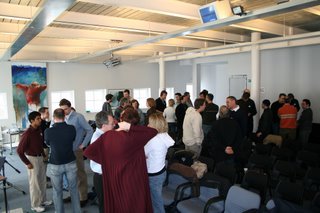¡Finalmente los Cristianos se pusieron las pilas en Bolivia!
Acabo de leer las noticias (La Razón del 29/03/2006) y me entero que los cristianos tomaron la sabia decisión de participar en la Asamblea Constituyente y hacer escuchar la voz de este grupo de personas, que según los datos de la Encuesta de Hogares 2001 oscilan entre el 20 y el 25% de la población boliviana. Evidentemente, tienen algo que decir pues esta presencia en el país no es despreciable.
Ya le he solicitado a una buena amiga que me consiga una copia (de preferencia pdf) del documento que los cristianos han preparado, y que inclusive la Conferencia Episcopal (de la iglesia de Roma en Bolivia) está considerando con seriedad, y si puedo haré comentarios en este sitio.
Creo que el modelo Cristiano es fundamental para traer soluciones a la crisis actual boliviana. Si los principios del Reino de Dios se aplicaran en la patria, se podría esperar una convivencia mucho más fraternal entre bolivianos. Uno de los principios que quiero resaltar hoy es justamente el de saber vivir en comunidad. Creo que la iglesia es una pequeña muestra de ello. El Reino está presente cuando personas que no tienen nada en común (por intereses distintos, doctrinas, educación, cultura, nivel socio-económico, idioma, raza, pasatiempos, filosofías, etc.) pueden reunirse y compartir en lo que tienen en común que es Jesús. Pero, ¿no es una maravillosa evidencia del Reino esta capacidad de convivir y colaborarse unos a otros pese a las diferencias? Y más aun, ¿amarse y respetarse los unos a los otros, valorando los aportes de cada uno? (Juan 13.34 y Juan 17.20-21)
Este estilo de vida diferente también implica solidaridad. La religión pura y sin mancha (Santiago 1.27) es pues ocuparse de las viudas y los huérfanos, ergo, de los más vulnerables de la sociedad, de los que no pueden valerse por si mismos. Este principio tiene que aplicarse también a los “pobres”, y como en uno de mis estudios he identificado a quienes son los más vulnerables del país, por ejemplo a la inseguridad alimentaria: personas que viven solas, ancianos y en el área altiplánica. Claro que esto no se hace de forma paternalística (digamos dando limosnas), pero invirtiendo solidariamente en el bienestar de todos. Una palabra para los empresarios es que paguen salarios justos y decentes ... conforme a la escritura, no conforme a cualquier otra filosofía humana ... Santiago 5.1-6 habla claramente al respecto, no me lo estoy inventando.
En un mundo que se está recalentando, es pues nuestra obligación el cuidar los recursos naturales, en el área que nos ha sido dada como herencia y sobre la cual ejercemos mayordomía. Independientemente de la forma, este aspecto no puede pasar desapercibido en la Constituyente. Es un principio del Reino el trabajar por la conservación de la tierra, porque Dios mismo juzgará a los que la destruyen (Apocalipsis 11.18).
En fin, ya era hora, y lo celebro.
Link al artículo
Armandoke


